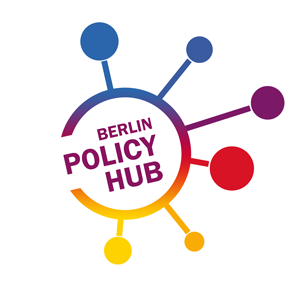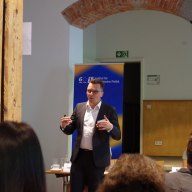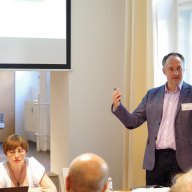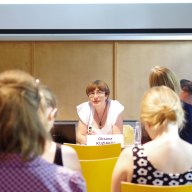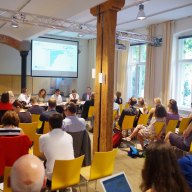13th Ukraine Breakfast Debate: Economic Challenges amidst a Changing Government: Will Ukraine Become More Open for Business?

On 25 June 2019, our 13th Ukraine Breakfast Debate on “Economic Challenges amidst a Changing Government: Will Ukraine Become More Open for Business?” took place within the framework of the project “Platform for Analytics and Intercultural Communication” (PAIC) in cooperation with Berlin Policy Hub. Our experts, Oksana Kuziakiv, Chief Executive of the Institute for Economic Research and Policy Consulting (IER) in Kyiv as well as Hlib Vyshlinsky, Executive Director of the Centre for Economic Strategy (CES) and Dmytro Yablonovskyy, Deputy Director of CES in Kyiv provided some first-hand analyses on the possibilities and challenges the new Ukrainian government and both long-standing and aspiring business owners might face in the near future.
In order to contextualize the future of economic policy and business development, Hlib Vyshlinsky first provided a SWOT analysis of the current state of the Ukrainian economy. Accordingly, the small budget deficit and the sizable leftovers of approximately $2.7 billion in the state budget by the end of May 2019 create a fertile ground for further economic and business development, especially regarding foreign trade. Still, the decelerated overall growth compared with the rest of the region, combined with the shrinking labor force present some major challenges for the recently elected president Zelenskyy. Vyshlinsky also presaged some additional problem areas such as the urgent external debt repayments of the public sector and the potential decrease or even suspension of the gas transit from Russia. Hence, according to Vyshlinsky, the need for the new government to maintain macroeconomic stability, by guaranteeing the independence of the central bank and by following a prudent fiscal policy, is exceedingly apparent. Large-scale privatization, employment measures combined with human capital innovation and the further strengthening as well as adherence to the rule of law were key points of his recommendations.
Oksana Kuziakiv subsequently presented some contemporary business trends in Ukraine, based on the longitudinal Business Tendency Survey (BTS) of Kyiv-based Institute for Economic Research and Policy Consulting. Generally speaking, a rather positive climate prevailed in the business sector since 2015. While the business environment has become more predictable since 2016, some uncertainty could in fact be measured in the last couple of months, due to the presidential election, as it has previously been the case in times of ballots. The business development expectations of both larger companies as well as small and medium-size enterprises (SMEs) have improved since April 2019. However, some challenges are still reportedly present in the business community, such as general market shortages, high competition and the alarming problem of the declining domestic labor force. According to the most recent surveys, business owners in Ukraine expected e.g. (1) the reduction of the so-called single social contribution (SSC), (2) the simplification of the taxation system and (3) an introduction of different instruments of state support.
Dmytro Yablonovskyy, Deputy Director of the Centre for Economic Strategy (CES) presented their current joint study on the possibilities of small and medium-sized business development in Ukraine, based on the success of the German SME sector. Yablonovskyy and his team suggest more investment into innovation support centres and university clusters as well as the establishment of an overarching business network similar to the German Chambers of Commerce.
In order to broaden the perspective of the debate, our German commentators, Dr. Niclas Rüffer from the Kyiv office of the Deutsche Gesellschaft für Internationale Zusammenarbeit (GIZ) and Ute Kochlowski-Kadjaia, Managing Director at the German Eastern Business Association elaborated on the abovementioned topics. Rüffer supported the Ukrainian proposals of a stronger orientation towards Research & Development (R&D) and human capital, and highlighted the importance of well-established vocational education in the context of SME. He furthermore pleaded for more government support for grassroots business initiatives and networks as well as for the expansion of horizontal R&D networks throughout the regions. Kochlowski-Kadjaia sketched some of the practical deficits of the Ukrainian economy vis-à-vis the attraction of German as well as other foreign businesses, especially the inadequate legal and regulatory framework and the high level of corruption. She also argued for a long-term (and more diversified) export enhancement to the EU, with increased SME participation.
The experts and the participants further discussed the challenging task of business privatization, considering the informal power of oligarchs and their disproportional strong capital base as well as the question of economic and industrial transition in the Eastern regions of Ukraine. In connection with the latter topic, many emphasized the role of the on-going war in the Donbass and the resulting necessity for continuous foreign support, especially from EU countries.
This event was a joint venture of the IEP projects “Platform for Analytics and Intercultural Communication” (PAIC) and the Berlin Policy Hub. The project PAIC aims at promoting professional expertise among Ukrainian think tanks, creating synergies between German and Ukrainian think tanks and transferring knowledge about developments in Ukraine to Germany. PAIC is conducted in close cooperation with the Ilko Kucheriv Democratic Initatives Foundation (DIF, Kyiv) and the think tanks development and research initiative think twice UA (Kyiv) and is kindly supported by the Federal Foreign Office. The Berlin Policy Hub seeks to bridge the gap between Europeanization discourses in the EU (Germany) and EU neighboring countries by bringing together policy research organizations from Eastern Partnership countries (Georgia, Moldova and Ukraine) with their counterparts and decision-makers in Berlin. IEP acts as a first contact-point, hosting institution and gateway for think tanks eager to expand their networks with German research institutions and relevant policy makers.
